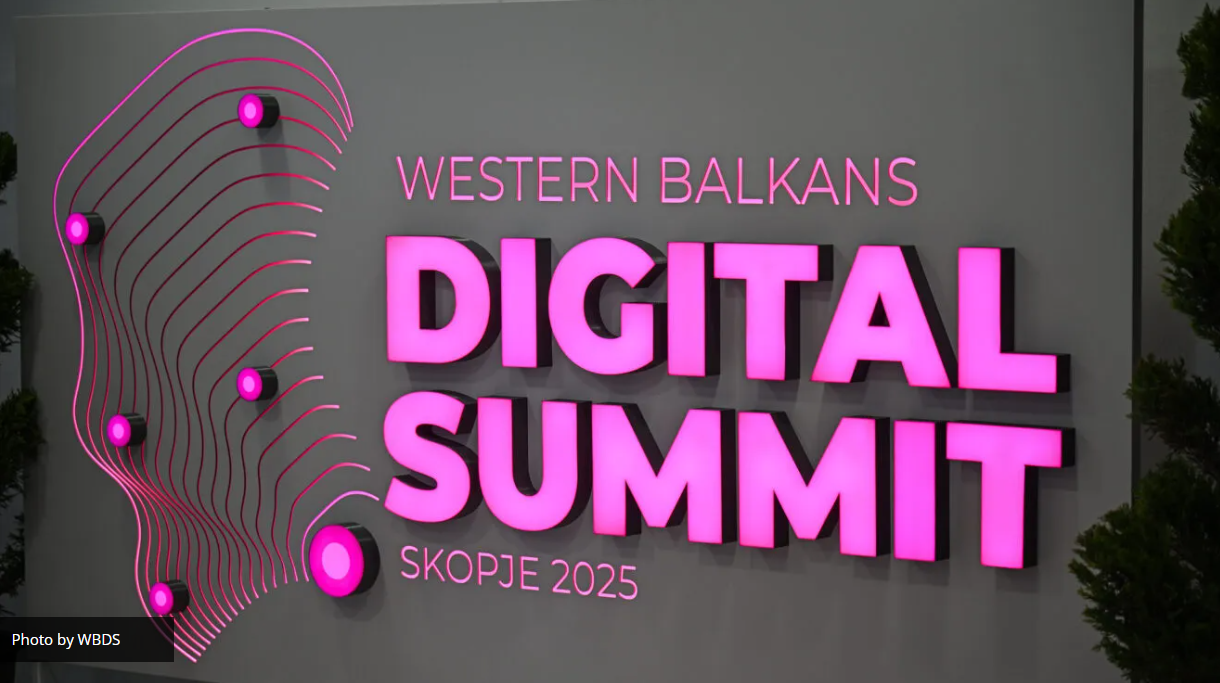For the original article please see here: NRENs driving digital transformation in the Western Balkans: Highlights from the WBDS 2025 | GÉANT CONNECT Online
The Western Balkans are at a critical juncture in their digital transformation journey. The region has made significant progress in connectivity, broadband infrastructure, and access to digital services, yet challenges remain. Innovation ecosystems are still emerging, and brain drain continues to limit the availability of talent for research and high-tech sectors. National Research and Education Networks (NRENs) in the region play a crucial role in addressing these gaps, supporting universities, research institutions, startups, and public services to foster tangible innovation.
On the 1st of October, the 2025 Western Balkans Digital Summit (WBDS) in Skopje hosted a public conversation on these issues with representatives of NRENs from the region. Aleksandar Poposki and Vladislav Bidikov from the North Macedonian NREN MARnet, Arjan Xhelaj from the Albanian NREN RASH, Valentina Radulović from the Science Tech Park in Montenegro and Fjolla Restelica Ahmeti, Digital Development Expert at the World Bank for the region (and previously at the Kosovo* Research and Education Network KREN) inspired the audience by sharing their experiences as leaders in the sector.

NRENs: Catalysts for innovation and collaboration
NRENs are more than just network providers. They offer their own set of services, adapt GÉANT’s global services to local needs, and build communities, connecting research, education, and entrepreneurship across borders.

“Many providers today can deliver connectivity, but GÉANT and the NRENs deliver community.” – Arjan Xhelaj, CEO of RASH
Additionally, through shared best practices and peer support, NRENs foster an environment where innovation thrives.
Throughout the panel, Fjolla highlighted KREN’s rapid progress: despite being one of the youngest members of the GÉANT Association, the organisation leveraged GÉANT’s community of practice and its international collaboration to scale digital capacity in schools and universities. She also pointed to the opportunity of aligning GÉANT activities in the region with World Bank initiatives, a model that KREN benefitted of and that could help strengthen regional coordination for further concrete growth across borders.
Among the panellists, Valentina emphasised the importance of strategic partnerships, particularly between NRENs and national science parks. In Montenegro, these collaborations have been made possible through strong government recognition of NRENs as national assets, ensuring their role as enablers of a vibrant innovation ecosystem where talent can thrive, and research can translate into market-ready solutions.
From connectivity to digital transformation

The MARnet representatives, Aleksandar and Vladislav, reflected on the organisation’s evolution over the past two decades, from an internet provider to a driver of digital transformation. Today, MARnet ensures equal access to research and education resources, supporting institutions of all sizes under the principle that “no one is left behind.” Aleksandar’s message to the policy makers in the room was unequivocally clear: “Our NRENs are not a cost: they are our most strategic investment in digital sovereignty. They are the key to retaining our brightest minds and securing our academic institutions.”
Vladislav reinforced this perspective, noting how NRENs working on their strategic positioning enables them to influence policy from within, secure funding, and engage government stakeholders in long-term planning. It is worth noting that MARnet is a full public service at disposal of research and education, while other NRENs might have hybrid structures, or work in the public sector operating as commercial entity.
Seizing the moment

Timing is crucial. NRENs currently hold a “sweet spot”, aligning with the EC’s ambitions, engaging governments and regional stakeholders, offering an opportunity to shape policies and investment decisions that will define the region’s digital trajectory. As several panellists agreed, strong coordination among NRENs can combine infrastructure, skills development, and innovation support, ensuring that the region does not merely catch up with Europe’s digital leaders, but actively contributes to the European digital ecosystem.
Looking ahead: Echoing the WBDS 2025 Message
The 2025 Western Balkans Digital Summit highlighted a shared vision: connectivity and collaboration are the foundations for a region where talent stays, ideas flourish, and digital transformation benefits all. By continuing to build the high-performance networks that link universities, labs and data centres across borders, connect people to access resources securely and without frictions of political willingness or access to funding, then the region will continue its growth and harmonisation in the European landscape of innovation.

